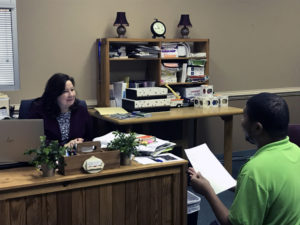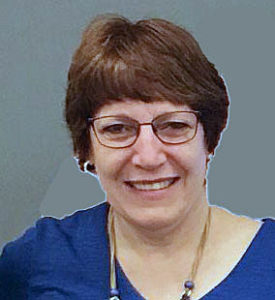Eating Healthy on a Budget: A Project-based Learning Approach

by Mary Cherry
 Project-based learning (PBL) has proven to be an effective method for developing soft skills and preparing adult learners for postsecondary and career transitions. PBL is one of the three teaching approaches utilized in Teaching the Skills That Matter (TSTM). Each of the five content areas presented in the TSTM Toolkit contains a project-based learning lesson. I chose the lesson, “Eating Healthy on a Budget,” from the Financial Literacy section to teach a class of ABE/GED® students in January, 2020.
Project-based learning (PBL) has proven to be an effective method for developing soft skills and preparing adult learners for postsecondary and career transitions. PBL is one of the three teaching approaches utilized in Teaching the Skills That Matter (TSTM). Each of the five content areas presented in the TSTM Toolkit contains a project-based learning lesson. I chose the lesson, “Eating Healthy on a Budget,” from the Financial Literacy section to teach a class of ABE/GED® students in January, 2020.
I quickly discovered that the lesson assumed some prerequisite skills (i.e., various ideas regarding “healthy” eating) that needed to be addressed. The lesson was introduced with a discussion about grocery budgets and healthy eating habits, and students brainstormed and shared ideas for saving money when grocery shopping. Following the discussion, the toolkit suggested playing an NPR video to present the topic, “food deserts.” However, I found a video prepared by the College of Agriculture at Virginia State University that was more relevant to our geographical area and student population.
After the initial discussion and watching the video, the students determined the focus of our project would be locating community resources available to supplement monthly grocery deficits. To present their final project, the students secured a neighborhood meeting space to host a presentation for members of the public and local leaders.
 To begin the project, the class brainstormed a list of possible resources and volunteered for specific roles necessary to complete the project. They utilized Internet searches to find local organizations, government agencies, and offices. Then, the students created questionnaires and role-played interviews in preparation for meetings with the town manager and Chamber of Commerce leader. They also made telephone calls to surrounding towns inquiring about community gardens and food banks and created a survey on SurveyMonkey to learn about how people in the community and in their families spend and save money on food. A paper copy of the survey was made available for those without Internet access. In order to conduct interviews, students were provided the option to travel with a partner. One student researched loyalty programs active in local grocery and drug stores. She also drafted a list of websites where students could obtain grocery coupons. All learners prepared a brochure to highlight their research. To help organize all of the information, we created a class notebook and a shared Google Drive to store notes and documents.
To begin the project, the class brainstormed a list of possible resources and volunteered for specific roles necessary to complete the project. They utilized Internet searches to find local organizations, government agencies, and offices. Then, the students created questionnaires and role-played interviews in preparation for meetings with the town manager and Chamber of Commerce leader. They also made telephone calls to surrounding towns inquiring about community gardens and food banks and created a survey on SurveyMonkey to learn about how people in the community and in their families spend and save money on food. A paper copy of the survey was made available for those without Internet access. In order to conduct interviews, students were provided the option to travel with a partner. One student researched loyalty programs active in local grocery and drug stores. She also drafted a list of websites where students could obtain grocery coupons. All learners prepared a brochure to highlight their research. To help organize all of the information, we created a class notebook and a shared Google Drive to store notes and documents.
“I never knew there was a community garden in the town next to us. It was good to learn about other places to find healthy food in our area.”
Unfortunately, the COVID-19 pandemic struck suddenly and we were not able to host our final presentation. We were about to create and distribute invitations and begin the process of drafting forms for feedback from audience members. Even though they were unable to present their final project, the students developed many valuable skills during the process. They learned to plan deadlines and be accountable to each other. When one student did not return to class, her peers quickly learned the impact an individual can have on the group and its progress. They also developed research and interview skills and were able to conduct interviews before we moved to remote learning. Students also learned how to analyze and graph the data collected from the survey.
“Eating Healthy on a Budget,” was a perfect lesson for my students! Although listed under “Financial Literacy,” it touched on all five of the TSTM content areas and addressed all nine foundational skills. One student stated that “working on the project was an amazing experience [that allowed me] to interview different people and get their opinions and perspectives.” Another student “enjoyed learning about saving money on my grocery bill.” The students also learned about resources in their community, with one student commenting, “I never knew there was a community garden in the town next to us. It was good to learn about other places to find healthy food in our area.” This project-based learning lesson is a great way to help adult learners develop skills they can use in the workforce as well as their community and family life.
 Mary Cherry ([email protected]) has a background in special education and more than 35 years of teaching experience. Since 2014, she has taught for Southside Virginia Community College Transitional Programs, where she has been active in professional development and program improvement efforts. She is a member of Virginia’s Teaching Skills that Matter pilot team.
Mary Cherry ([email protected]) has a background in special education and more than 35 years of teaching experience. Since 2014, she has taught for Southside Virginia Community College Transitional Programs, where she has been active in professional development and program improvement efforts. She is a member of Virginia’s Teaching Skills that Matter pilot team.